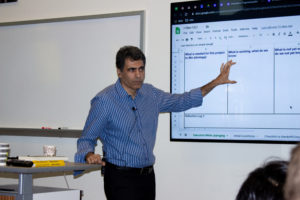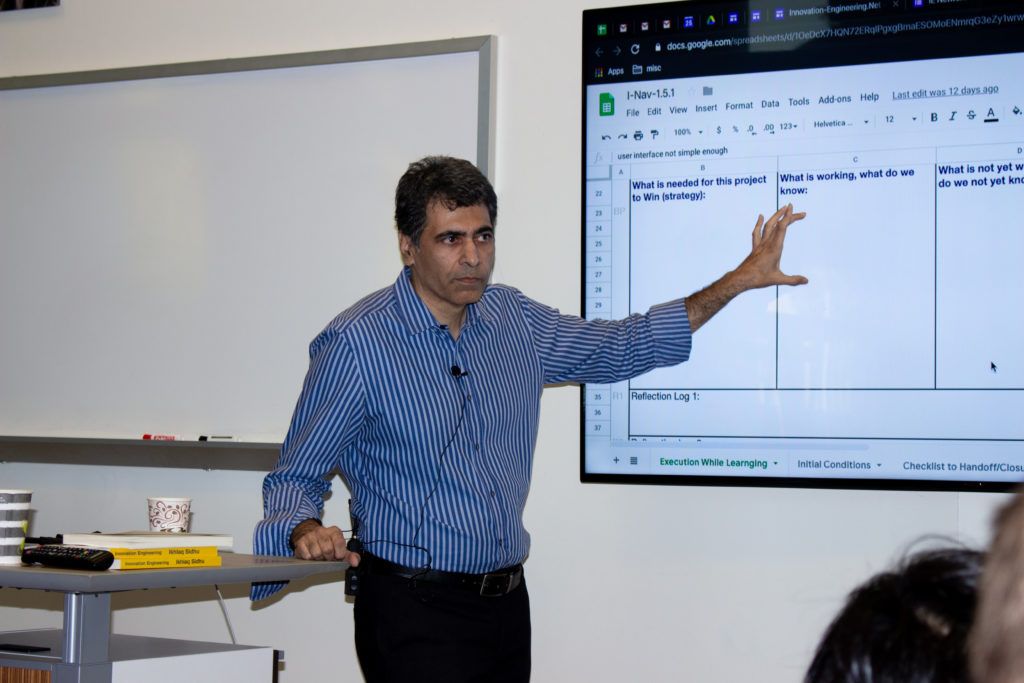Think of the process of innovation as learning to ride a bike. People can give you instruction, tell you how to balance and pedal your feet, but you won’t actually learn how to ride the bike until you get on and try it yourself.
One problem with the modern education system is that students rarely get the chance to “ride the bike” in the classroom. They are presented with facts, equations, theories, and rules that have already been shown to be true. Thus, students are taught to regurgitate the information they are given rather than arriving at a conclusion themselves.
Imagine I gave you an apple, and told you to drop it repeatedly over and over until you came up with the laws of physics… That would take a while. So instead I just tell you F=MA. This is what we do in classrooms all the time. But here’s the thing… although you now know the information, you never went through the process of figuring it out.
Ikhlaq Sidhu, Founding Director & Chief Scientist @ SCET
The apple analogy was elegantly crafted by Sidhu to illustrate the concept of inductive learning, one of the key pillars of the Sutardja Center’s new framework for creation called Innovation Engineering.
Inductive learning is a process by which the learner sees a result and begins to generate rules and patterns that lead to that result, openly cycling through strategies at every step of the way. At every interval, the learner identifies what has worked and what has not, and changes their approach accordingly.
The inductive learning approach to innovation is just one of the few key points in the newly developed process of Innovation Engineering, a framework spearheaded by Chief Scientist of the Sutardja Center, Ikhlaq Sidhu.
Sidhu’s newly published book, Innovation Engineering: A Practical Guide to Creating Anything New, wastes no time in providing a straightforward and practical guide to all things innovation. The book draws from Sidhu’s decades of involvement with Berkeley and Silicon Valley startups, providing a direct framework for the planning and execution of any idea.
The framework is just now being put to use, with regularly scheduled workshops being given to student groups and innovative teams who need a boost in the realm of planning and execution.
In addition to these workshops, an Innovation Engineering course will be available in Spring 2020 for graduate and undergraduate students. The 5G/AI course is centered on advanced project-based learning with a focus on data, 5G mobile communication, and artificial intelligence applications. All students with varying skills in data science, CS, engineering, web/mobile, and general technical abilities are encouraged to take the course.
Please contact us if you think an Innovation Engineering workshop could be helpful to your group or organization! We are actively working on implementing this process for the benefit of all innovative teams.
Think of the process of innovation as learning to ride a bike. People can give you instruction, tell you how to balance and pedal your feet, but you won’t actually learn how to ride the bike until you get on and try it yourself.
One problem with the modern education system is that students rarely get the chance to “ride the bike” in the classroom. They are presented with facts, equations, theories, and rules that have already been shown to be true. Thus, students are taught to regurgitate the information they are given rather than arriving at a conclusion themselves.
Imagine I gave you an apple, and told you to drop it repeatedly over and over until you came up with the laws of physics… That would take a while. So instead I just tell you F=MA. This is what we do in classrooms all the time. But here’s the thing… although you now know the information, you never went through the process of figuring it out.
Ikhlaq Sidhu, Founding Director & Chief Scientist @ SCET
The apple analogy was elegantly crafted by Sidhu to illustrate the concept of inductive learning, one of the key pillars of the Sutardja Center’s new framework for creation called Innovation Engineering.
Inductive learning is a process by which the learner sees a result and begins to generate rules and patterns that lead to that result, openly cycling through strategies at every step of the way. At every interval, the learner identifies what has worked and what has not, and changes their approach accordingly.
The inductive learning approach to innovation is just one of the few key points in the newly developed process of Innovation Engineering, a framework spearheaded by Chief Scientist of the Sutardja Center, Ikhlaq Sidhu.
Sidhu’s newly published book, Innovation Engineering: A Practical Guide to Creating Anything New, wastes no time in providing a straightforward and practical guide to all things innovation. The book draws from Sidhu’s decades of involvement with Berkeley and Silicon Valley startups, providing a direct framework for the planning and execution of any idea.
The framework is just now being put to use, with regularly scheduled workshops being given to student groups and innovative teams who need a boost in the realm of planning and execution.
In addition to these workshops, an Innovation Engineering course will be available in Spring 2020 for graduate and undergraduate students. The 5G/AI course is centered on advanced project-based learning with a focus on data, 5G mobile communication, and artificial intelligence applications. All students with varying skills in data science, CS, engineering, web/mobile, and general technical abilities are encouraged to take the course.
Please contact us if you think an Innovation Engineering workshop could be helpful to your group or organization! We are actively working on implementing this process for the benefit of all innovative teams.


